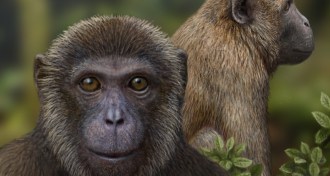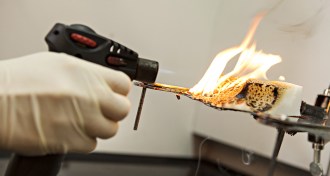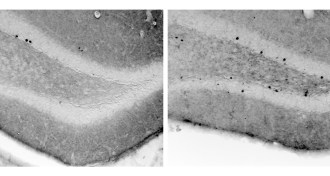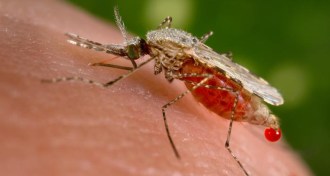News
-
 Life
LifeFossils point to ancient ape-monkey split
Apes and monkeys split from a common ancestor more than 25 million years ago, fossil finds suggest.
By Bruce Bower -
 Earth
EarthGroundwater isolated for eons
At least 1.5 billion years after it last saw the surface, flowing liquid may host life.
By Erin Wayman -
 Life
LifeBody’s clock linked to depression
Gene activity in the brain suggests that circadian rhythms are off-kilter in people with depression.
-
 Chemistry
ChemistryFlame quencher offers less toxic approach to fighting fire
New coating could protect furniture without causing health concerns.
-
 Life
LifeExploration forges differences in identical twins
Mice with the same genes and surroundings diverged in brain development depending on how much they moved around their environment.
-
 Space
SpaceMoon’s water may have earthly origins
Ratio of hydrogen to deuterium suggests molecule on both orbs has a common source.
By Andrew Grant -
 Earth
EarthThe Arctic was once warmer, covered by trees
Pliocene epoch featured greenhouse gas levels similar to today's but with higher average temperatures.
By Erin Wayman -
 Animals
AnimalsMalaria mosquito dosed with disease-fighting bacteria
After thousands of tries, lab gets parasite-carrying insect to catch Wolbachia.
By Susan Milius -
 Psychology
PsychologyBrain training technique gets a critique
In a new study, a popular style of memory workout leaves reasoning and mental agility flat.
By Bruce Bower -
 Health & Medicine
Health & MedicineBlack women may have highest multiple sclerosis rates
Large study counters common assumption that whites get MS more.
By Nathan Seppa -
 Humans
HumansEurope is one big family
Continent's ancestry merges about 30 generations ago, genetic study finds
By Meghan Rosen -
 Space
SpaceAtom’s core gets pear-shaped
Tapering asymmetry of some nuclei confirms predictions.
By Andrew Grant